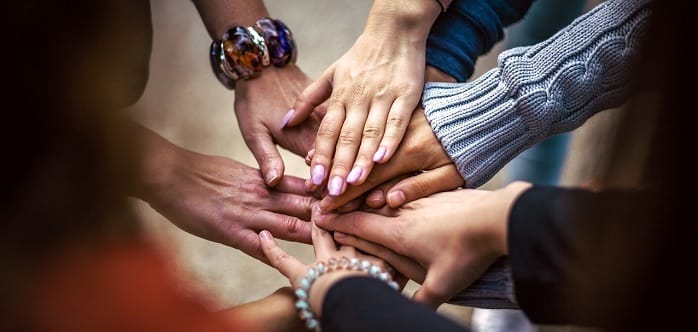In the year ending with March 2024, it was reported that around 3% of the UK’s population (around 1 million people) reported using a Class A drug in the last 12 months (1).
Though this is not a significant change from the previous year, it is still a significant amount of people who have used drugs such as heroin, LSD, cocaine, or MDA.
These are all ‘very high risk’ substances, and the statistics do not take into account the dangers that these individuals face as a consequence of consuming these substances, nor the potential addiction that they may develop.
When a loved one is struggling with an addiction, this can be especially straining on relationships, the health of the individuals involved, and the challenges that may arise as a result of this.
This blog post aims to explore the effects of a loved one struggling with addiction, as well as some top tips and resources for these individuals and how best for them to seek further care.

The Samaritans state that active listening is far more than just listening to somebody talking; it is far more complex than this and involves high levels of concentration (2).
By abiding by these definitions of active listening, an individual will be able to gain a far greater insight into the individual’s situation, how they may be feeling, and how they may need to be supported.
Without listening, the loved one that may be struggling with addiction may feel as though their situation is being ignored, they are not cared about, or that they are unable to access the support that they need.
When it comes to addiction, this can be especially harmful as addictions and the effects of this can often worsen exponentially if they are not properly treated and acknowledged.
Often, when individuals find themselves in situations in which they must discuss difficult topics, there can be a number of factors that intervene with this and can affect the quality of the conversation.
As humans, we do not often choose to seek out difficult conversations, but this is essential if the individual aims to support their loved one and learn more about their addiction, its effects, and the ways in which they may be able to help.
A common factor is that individuals may often try to interrupt to share their own experiences, but this is not often helpful as it detracts from the individual struggling with addiction and may not be relevant input for their situation.
In addition, interruption in general is always recommended to avoid as it, again, takes away from the individual’s struggles and can take the conversation away on a tangent.

As a brief guide, the Samaritans have created SHUSH listening tips – an acronym to help individuals learn to communicate and listen effectively.
This can be summarised by the following points:
Even if your loved one is not ready for support from you or from anyone else, it is still important to cement the idea of your trustworthiness and reliability when it comes to being a source of support for your loved one.
Often, a more casual approach to support is preferred, as many individuals have many ingrained misconceptions about a formal therapy setting for their care.
This is why just knowing that someone close one is nearby and has knowledge of the situation can be reassuring for your loved one, even if there is no direct contact happening.
No one can be forced to speak about something that they do not want to, so establishing this image and not pushing the conversation too far is a great way to show this without risking any damage to your loved ones’ condition.
The Samaritans suggest that good active listening comes from a place of self-love (2). When the individual is practising active listening, this should feel as though they do not want to interrupt or talk over their loved one, as they have no need to focus on their own issues at that time.
This comes from being able to listen to oneself. For example, if we are able to listen to our bodies and to know when we are tiring or reaching exhaustion, then we know that we are less able to practise active listening.
By focusing on our own struggles and anxieties, we are therefore in a ‘better place’ to help support someone close to us.
When someone close to us is struggling, it can be especially taxing, so ensuring that ones’ own health and wellbeing is taken care of is an essential first step before being in a position to help others.

When we are helping a loved one with their issues, it is often far more difficult to be non-judgmental, bias-free, or completely impartial.
This is because we know this person and we want the best for them. If this is not true, then it can often cause serious problems with both the parties’ physical and mental health suffering as a result of this.
One of the key principles of the Samaritans is their belief that every individual knows what is best for them, and that they will find their own answers in time – we will never truly know what others are thinking and what is truly worrying them (2).
Therefore, all we can do is provide a safe space for our loved ones to feel supported in a non-judgemental way.
If we do show judgement when listening to our loved ones, then this can quickly become a negative and they may stop sharing what they are dealing with completely, making you an unreliable and untrustworthy form of support – something which is hugely detrimental in both rehabilitation and familial relations.
Though it may be a rather cliché saying, it is vital to remember that not everyone has everything going right for them at every moment of the day.
“It’s okay not to be okay”
Individuals who try to continue as though nothing is wrong can often face serious consequences as a result of this, often supressing feelings and effects – a huge red flag in the field of addiction.
This can be a great way to open the conversation between you and your loved one but is also a vital principle to remember throughout the duration of the individual’s support and rehabilitation.

If you feel as though you need additional help in supporting your loved one with addiction, then there are many different sources of support that an individual may seek for a variety of different situations.
The remainder of this blog post outlines some of these key sources of support, as well as describing some of the key features of these sources.
Perhaps the most well-known confidential, non-judgmental, and non-religious advice service available across the UK, the Samaritans is a registered charity that aims to provide support to any individual experiencing emotional distress.
This could include struggling with or supporting someone with an addiction, for example.
The Samaritans are also the contributors of the book on which this blog post is heavily based (2).
The best way to contact them is through their telephone hotline, but they also run support sessions across the UK, as well as running different events across the country and throughout the year.
Another option for individuals specifically struggling with an addiction is to seek a suitable form of rehabilitation.
This is where an individual will learn to overcome the struggles of their addiction, as well as creating coping mechanisms and techniques to manage the long-term consequences.
Rehabilitation is specialised and tailored to each individual; each individual will have different needs and requirements for their care. Speak to an addiction specialist or referral service such as Rehab 4 Addiction to enquire further.
Alcoholics Anonymous (AA) and Narcotics Anonymous (NA) are a specific form of rehabilitation treatment in which an individual attends regular meetings with like-minded individuals.
This is a highly recommended form of treatment, as it incorporates group talking therapy i.e., multiple individuals speaking together about their experiences, and it can also be specialised and tailored to the individuals that attend.
Most AA and NA meetings may follow a religious 12-step approach, but there are alternate options for an individual for whom this style of treatment may not be suitable.

If a loved one is struggling more generally with their mental health and they are not facing any immediate physical risk, for example, then it may be suitable for these individuals to speak to their local GP.
This is not a service that many individuals recognise as a part of the UK’s NHS healthcare system, but it is one that is progressing and evolving into the modern age.
Through the individual’s GP or local doctors’ office, they may be able to be referred to specialist local therapy sessions, group sessions, and other activities that are recommended for the individual’s mental wellbeing.
GamCare was founded in 1997 specifically for individuals who struggle with an addiction to gambling. This is an addiction where an individual will continuously seek to gamble, often causing themselves and those around them severe financial damage and risk.
Through their services, an individual can access information, advice, and support for the effects of a gambling addiction. They also work toward the heightened awareness of gambling addictions and the effects that this can have on an individual and those close to them.
From this support, these individuals are then offered structured support to help them overcome these issues and cope with the effects in the long-term.
Specialising in support for individuals who have experienced bereavement, Cruse runs 83 branches across England, Northern Ireland, and Wales, as well as 72,147 support activities across these regions.
Cruse pride themselves on supporting, respecting, and understanding those who have experienced loss, and may be suitable for a number of individuals who have also been struggling with additional mental health issues such as addiction.
With over 60 years’ experience in supporting unpaid carers (as of 2025), Carers UK gives advice and support to individuals caring for their elderly, disabled, or seriously ill loved ones through a number of different channels.
Carers UK can provide information and advice, help carers connect, and campaign for long-lasting and innovative changes to the caring system.
Providing general support for families experiencing struggles such as domestic violence, financial issues, and sheltered housing, Family Action has been helping families since 1869.
Now in the modern age, Family Action have updated their support for families, being aware that there are many definitions of a ‘family’ now, and that struggles and influences in the 1800s are far different from how the modern age is today.
Suitable for children aged 18 and younger, Childline is another well-known source of support in the UK for young individuals.
Childline offers advice on a wide range of factors that influence young people today such as domestic struggles, internet safety, and self-care, for example.
The UK’s non-emergency number, dialling 111 contacts the NHS services in situations where help may not be needed immediately.
In some cases, the operators may suggest immediate sources of care and support, but this is a great way to get in contact with the most appropriate services at the time.
In a more general sense, some individuals’ loved ones may require a change of environment, whether this is for social, addiction, or safety reasons.
There are many different sources of housing shelter referrals and support, such as some of the previous sources of support in this list.
Should an individual require immediate changes to their location in the event of an emergency, then it is always best to contact the individual’s local services.
BACP is an established association within the UK that regulates and offers counselling services across the country.
With a ‘desire for social justice’, BACP helps individuals to seek the most appropriate and professional form of counselling for them, as well as educating them on the best practises in the field and how these may influence an individual’s time in therapy.
One of the UK’s leading mental health charities, Mind UK fights for the mental health of the UK’s population.
By making mental health their priority, Mind UK offers information, advice, and local services where an individual may need them.
They also run a number of events and shops across the country to raise money and awareness for their cause.
The UK’s leading charity for older people and the ageing population. Made up of multiple independent charities, Age UK aims to ‘change how we age’.
This refers to providing vital support for elderly people, as well as increasing awareness and driving change surrounding the stereotypes of ageing.
As can be inferred from the name, Veteran’s Gateway is a website and app that provides support and information for veterans and their loved ones.
Whether these individuals are based in the UK or abroad, Veteran’s Gateway supports individuals on a one-to-one basis and gets them in contact with the right support as soon as possible.
Dealing with a number of different relationship issues across the country, Relate helps individuals in many different and unique situations.
They provide face-to-face counselling, as well as specific forms of therapy for different issues such as romantic relationships, family, mediating relations, children, young people, and sex therapy.
Relate offers 30-minue phone chats, as well as ongoing and supported therapy with dedicated therapists.

To learn more about supporting a loved one, whether this is related to addiction or not, Rehab 4 Addiction can point you and those around you in the right direction, helping you to get the support that you need as soon as possible.
Many of these issues described and outlined in this blog post can worsen exponentially over time, both in terms of their physical and mental health impact.
To speak to a member of our professional, non-judgemental, and friendly team about an issue relating to anything you have read in this blog post, call our addiction support line on 0800 140 4690 today.
[1] Office for National Statistics; Drug misuse in England and Wales: year ending March 2024; 12 December 2024; https://www.ons.gov.uk/peoplepopulationandcommunity/crimeandjustice/articles/drugmisuseinenglandandwales/yearendingmarch2024
[2] Colombus, K., 2021. How to Listen: Tools for opening up conversations when it matters most. Hachette UK.